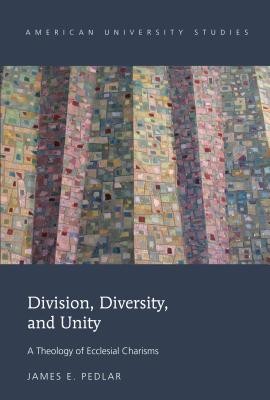
- We will send in 10–14 business days.
- Author: James E Pedlar
- Publisher: Peter Lang Inc., International Academic Publishers
- ISBN-10: 143313005X
- ISBN-13: 9781433130052
- Format: 15.2 x 22.9 x 1.8 cm, hardcover
- Language: English
- SAVE -10% with code: EXTRA
Reviews
Description
The term «charism» is drawn originally from Pauline literature and refers to a gift given by the Spirit for the upbuilding of the body of Christ. Since the mid-twentieth century, Christians from a broad spectrum of theological positions have applied this term, in varying ways, to groups within the Church. However, no book thus far has provided a rigorous and sustained critical investigation of this idea of ecclesial charisms. In Division, Diversity, and Unity, James E. Pedlar provides such an investigation, drawing on biblical and systematic theology as well as literature on church renewal and ecumenism. Against those who justify denominational separation in order to preserve particular gifts of the Spirit, Pedlar insists that the theology of charisms supports visible, organic unity as the ecumenical ideal.
Division, Diversity, and Unity argues that the theology of ecclesial charisms can account for legitimately diverse specialized vocational movements in the Church but cannot account for a legitimate diversity of separated churches. Pedlar tests and develops his constructive proposal against the fascinating and conflicted histories of two evangelistic movements: the Paulist Fathers and The Salvation Army. While the proposed theology of ecclesial charisms stakes out a legitimate and important place in the Church for specialized movements, it excludes any attempt to justify the permanent separation of an ecclesial body on the basis of an appeal to an ecclesial charism.
EXTRA 10 % discount with code: EXTRA
The promotion ends in 10d.08:21:14
The discount code is valid when purchasing from 10 €. Discounts do not stack.
- Author: James E Pedlar
- Publisher: Peter Lang Inc., International Academic Publishers
- ISBN-10: 143313005X
- ISBN-13: 9781433130052
- Format: 15.2 x 22.9 x 1.8 cm, hardcover
- Language: English English
The term «charism» is drawn originally from Pauline literature and refers to a gift given by the Spirit for the upbuilding of the body of Christ. Since the mid-twentieth century, Christians from a broad spectrum of theological positions have applied this term, in varying ways, to groups within the Church. However, no book thus far has provided a rigorous and sustained critical investigation of this idea of ecclesial charisms. In Division, Diversity, and Unity, James E. Pedlar provides such an investigation, drawing on biblical and systematic theology as well as literature on church renewal and ecumenism. Against those who justify denominational separation in order to preserve particular gifts of the Spirit, Pedlar insists that the theology of charisms supports visible, organic unity as the ecumenical ideal.
Division, Diversity, and Unity argues that the theology of ecclesial charisms can account for legitimately diverse specialized vocational movements in the Church but cannot account for a legitimate diversity of separated churches. Pedlar tests and develops his constructive proposal against the fascinating and conflicted histories of two evangelistic movements: the Paulist Fathers and The Salvation Army. While the proposed theology of ecclesial charisms stakes out a legitimate and important place in the Church for specialized movements, it excludes any attempt to justify the permanent separation of an ecclesial body on the basis of an appeal to an ecclesial charism.


Reviews